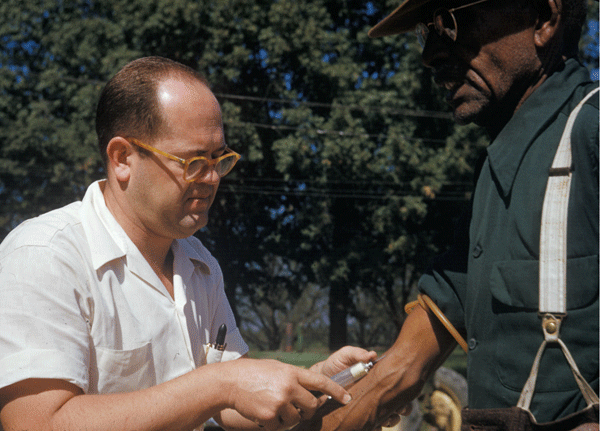

We may earn revenue from the products available on this page and participate in affiliate programs. Learn more ›

In November 1974, President Richard Nixon signed the National Research Act into law. Some of the rules established by the law and its subsequent revisions seem so commonsense it’s hard to imagine they needed to be codified into a bill. Don’t knowingly deny subjects life-saving medication, for example. And don’t experiment on people without their consent. But those rules did need to be formalized into the law.
It’s been 45 years since most of the nation first learned about the Tuskegee experiment—a research study that violated even these basic strictures of human dignity. And now, more than ever, Americans need to remember it.
On July 25, 1972, Associated Press reporter Jean Heller broke the story that the United States Public Health Service had let syphilis ravage the bodies of hundreds of black men in the rural community of Tuskegee, Alabama.
The researchers wanted to see how the disease would progress unchecked. They put on blinders—to the way that syphilis devours the body’s organs, causing heart problems, mental disorders, and even death—even as they looked into their subjects’ eyes to draw blood, and cut into their flesh for autopsies.
When the study began in 1932, syphilis had no cure. But by the 1940s, the Scottish biologist Alexander Fleming’s miracle cure, penicillin, was treating the disease with success. The Tuskegee study participants were denied the cure because it would have interfered with the researchers’ understanding of the disease’s progression. And the participants didn’t know to ask for the cure themselves, because they did not know they were sick.
The Public Health Service never told them that they had syphilis. They also never worried that they would pass the disease to unsuspecting spouses and partners, or to the innocent babies those partners might bear. At least 22 wives, 17 children, and two grandchildren got syphilis as a result.
Through all of this, the Tuskegee participants did not even know they were being studied. They were told they were a part of a free government healthcare program.
In 1997, Albert Julkes Jr., whose father was an unwilling participant in the study, told the New York Times, ”It was one of the worst atrocities ever reaped on people by the government. You don’t treat dogs that way.”
That same year, President Clinton would offer an official apology:
The public outcry after the AP report would cut the study short, erode trust in the federal government, and create the transparent framework in which medical research now operates. You can’t experiment on people without their informed consent. Subject participants need to know not only that they’re being experimented on, but the potential consequences of that experimentation. And you can’t withhold a cure just to see what happens if you do.
But the legacy of Tuskegee, arguably like that of America’s first bomb test, is deeper than legislative. If what was stolen from these men and their families has any broader value, it could be as a reminder of transparency in science—and the harm that can result when we lose it.
It is, perhaps, an especially poignant reminder as we worry about the politicization of government science. In recent months, the EPA has decided to undermine greenhouse emission regulations, despite hundreds of studies saying that the pollutants kill. The agency also recently reversed course on banning chlorpyrifos, a pesticide linked to the slow poisoning of residents in California’s Central Valley. Proposed regulatory rules—to help people know how much sugar is in their food, for example—have also been delayed. And not in the interest in the public.
The justice Louis Brandeis once wrote that, “Sunlight is said to be the best of disinfectants.” Transparency makes science better, and keeps us safe. The original sin of the Tuskegee experiment is not that the residents were denied care, but that they were denied a choice. They were denied agency over their own lives and bodies.
Whenever we take a deep breath of polluted air, swallow supplements that are secretly adulterated, or slather our hair with cleansers that have not been tested for safety or at least warned that it might leave us bald, we’re denied a tiny fraction of that same agency. Over the past 50 years the country has moved toward increasing transparency for that very reason. In remembering the terrible legacy of Tuskegee, we must endeavor to keep our policies from moving back into the dark.
